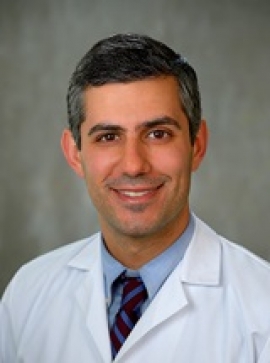
Ali Hamedani, MD, MHS is an Assistant Professor of Neurology at the University of Pennsylvania. His research is focused around the role of visual dysfunction in Parkinson’s disease and other neurodegenerative disease outcomes (especially hallucinations and other neurocognitive sequelae) using national health surveys and administrative claims data. He has also examined the prevalence and health care utilization patterns associated with visual impairment in the older adult population. He obtained his MD at the University of Maryland School of Medicine. He also holds a Master’s degree in Epidemiology from the Johns Hopkins Bloomberg School of Public Health. After completing his neurology residency at the University of Pennsylvania, Dr. Hamedani obtained fellowship training in both neuro-ophthalmology and movement disorders.
Contact information:
423 Guardian Drive
Blockley Hall 829
Philadelphia, PA 19104
Education:
B.S. (Biology)
Yale University, 2008.
M.H.S. (Epidemiology)
Johns Hopkins Bloomberg School of Public Health, 2012.
M.D.
University of Maryland School of Medicine, 2013.
Post-Graduate Training:
Internal Medicine Internship, Hospital of the University of Pennsylvania, 2013-2014.
Neurology Residency, Hospital of the University of Pennsylvania, 2014-2017.
Samantha and Michael Jordan Neuro-Ophthalmology Fellowship, Hospital of the University of Pennsylvania / Scheie Eye Institute / Children’s Hospital of Philadelphia, 2017-2018.
Neuroepidemiology Post-Doctoral Training Program, Perelman School of Medicine, University of Pennsylvania, 2018-2020.
NeuroNEXT Clinical Research Fellows Training Program, University of Pennnsylvania, 2019-2020.
Certifications:
American Board of Psychiatry and Neurology, 2017.
Selected Publications:
Xu A, Hamedani AG: Cataract surgery utilization in Parkinson’s disease: the English Longitudinal Survey on Ageing. Association for Research in Vision and Ophthalmology April 2023.
Hamedani AG, Willis AW, Ying GS: Visual impairment, age-related eye disease, and neuropsychiatric outcomes in older adults. Association for Research in Vision and Ophthalmology April 2023.
Li M, Hamedani AG: Association of visual impairment with neuropsychiatric symptoms of dementia. Association for Research in Vision and Ophthalmology April 2023 Notes: Platform presentation, ARVO Travel Award for mentee.
Xue K, Feng Y, Tam V, Lin CC, De Lott LB, Hamedani AG: Sociodemographic and geographic variation in access to neuro-ophthalmologists in the United States. North American Neuro-Ophthalmology Society March 2023.
Markowitz D, Aamodt W, Hamedani AG: Social Determinants of Health in Idiopathic Intracranial Hypertension. North American Neuro-Ophthalmology Society March 2023.
Feng Y, Lin CC, Hamedani AG, De Lott LB: A Validated Method to Identify Neuro-Ophthalmologists in a Large Administrative Claims Database Journal of Neuro-Ophthalmology Jan 2023.
Lin SC, Giang A, Pistilli M, Liu GT, Avery RA, Shindler KS, Hamedani AG, Ross AG, Tamhankar MA: Frequency and etiologies of visual disturbance after cataract surgery identified in neuro-ophthalmology clinic. Journal of Neuro-Ophthalmology January 2023.
Xue K, Feng Y, Tam V, Lin CC, De Lott LB, Hamedani AG: Sociodemographic and geographic variation in access to neuro-ophthalmologists in the United States. Journal of Neuro-Ophthalmology in press 2023.
Hamedani AG, McPherson TO, Aban I, Lee I, Kupersmith MJ, Wolf GI, Kaminski HJ: Attitudes and beliefs towards thymectomy in the Myasthenia Gravis Patient Registry. Journal of Clinical Neuromuscular Disease in press 2023.
Morrison AH, Liu GT, Hamedani AG: Ocular myasthenia gravis. Current Treatment Opinions in Neurology in press 2023.
Content Area Specialties
Neurology
Ophthalmology